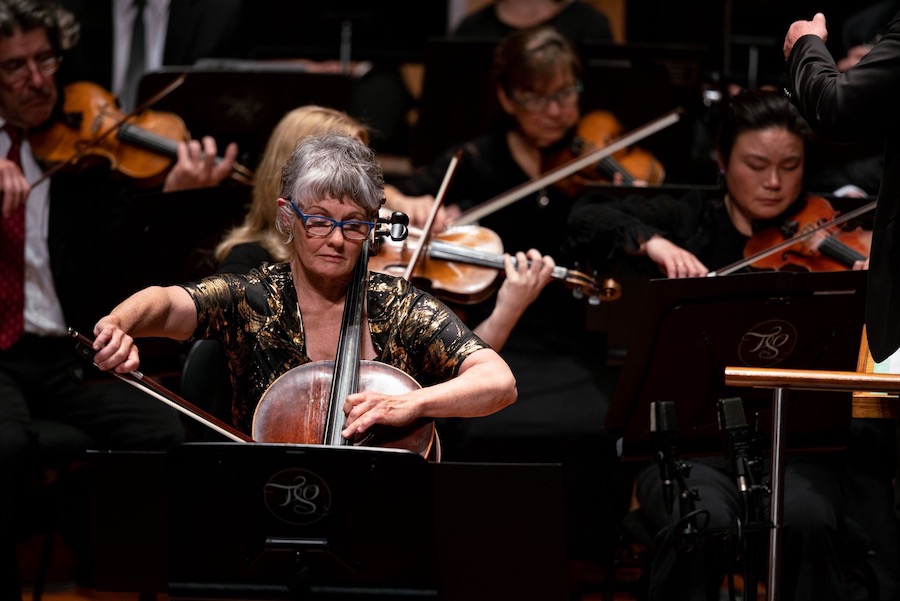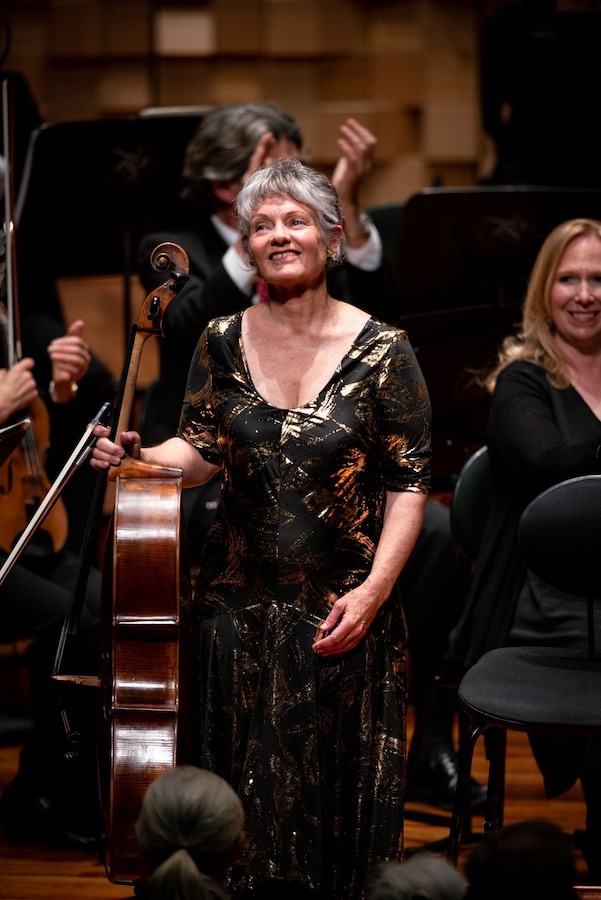Last Friday afternoon, concertgoers in the Federation Concert Hall came together to celebrate the career of Tasmania’s cello star Sue-Ellen Paulsen. She gave her official farewell performance by way of a Tasmanian Symphony Orchestra matinee, in which she performed three short works in a beautifully curated program. The event was titled Swansong; a charming pun that united the sentiment of the occasion with one of the most beloved pieces of the performance.
 Sue-Ellen Paulsen. Photo supplied
Sue-Ellen Paulsen. Photo supplied
Paulsen has enjoyed an illustrious career as principal cello with the Tasmanian Symphony Orchestra since 1986. A burgeoning artist who first won the 1980 ABC Concerto Competition and a scholarship to study music in Vienna, she pursued her orchestral and solo career in Australia. But she has also formed valuable relationships with generations of musicians as she teaches cello at the University of Tasmania Conservatorium of Music – and has influenced contemporary composers who have written passages for her instrument knowing she’d be playing, a fact TSO violist William Newbery announced when he took to the stage to introduce the concert. He shared that he’d first seen Paulsen perform an impressive Shostakovich Cello Concerto No 1, and generously praised her memorable career. He also revealed a new CD released on the afternoon of the concert, featuring Paulsen playing the Elgar Cello Concerto, Tchaikovsky Rococo Variations, and other works recorded with the TSO.
The first piece in this particular concert, however, was Schumann’s Manfred Overture, which did not yet feature Paulsen. This was just as well as, at this time, there were still a few empty seats due to latecomers. It’s no exaggeration to claim that the city’s most dedicated music lovers made efforts to see Paulsen off; traffic was held up throughout most of the city, parking near the hall was scarce, and waves of crowds rushed to make it along. I wondered if this sense of urgency and anxiety was also in the minds of the performers, as this opening piece was not presented with the precision to which I’ve grown to expect from this talented body of players. There were too many untidy entries – a concern that wasn’t alleviated in any of the works to follow in this concert’s opening half.
Nevertheless, the Manfred concluded and a few more latecomers were thankfully able to enter the hall in time to see Paulsen make her big entrance. She emerged in a black and gold dress, which showed her literally beaming for her solo performance, starting with Respighi’s Adagio con variazioni. The cellist’s playing was deeply tender; this earnest interpretation of a charming work certainly tugged on the heart-strings. It must have been a challenge to perform in the context of a goodbye, and I’d imagine there were a few wet eyes through the hall as she told this story of music.

Tchaikovsky’s Pezzo capriccioso followed, and it appeared the program had been designed in such a way as to showcase Paulsen’s varying skill – technical prowess through this rapid work, and emotional expression through the surrounding ones. It therefore also served as a reminder of what we’d miss with her departure from the orchestra. She sped through this challenging work, fingers fluttering up and down the instrument. It was occasionally hard to hear her as some of these passages were concealed under the orchestra, and the players would have done well to give their soloist more space dynamically. But this skilful performance led into the big moment of the afternoon – Saint-Saëns’ The Swan from Carnival of the Animals. For this, the cellist performed with no sheet music. She closed her eyes, and appeared to place her whole soul in the hands of the music. It was enchanting, and she played immaculately. It was met with a standing ovation – not just for this work, but in honour of her life’s work.
After the interval, the orchestra returned to perform Schumann’s Symphony No 2 – giving us a taste of Paulsen’s impending absence from the orchestra’s cello section. Further to this, the players presented a far worthier send-off to Paulsen compared to the opening: all the technical concerns of the first half had dissipated, and we were presented with an exciting and high-calibre performance.
The work pleased the hall so much that a few claps managed to sneak out between the movements. One violist looked like he was having so much fun, he often bounced right out of his chair in time with some of Schumann’s beats. It was distracting but reflected the bright and joyful feel of this major work; indeed, conductor Marko Letonja looked very pleased, and after the music concluded, he wove his way across the stage to greet and cheer many individual players for their success.











Comments
Log in to join the conversation.